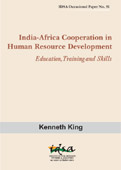India-Africa Cooperation in Human Resource Development: Education ,Training and Skills
 Human resource development (HRD) and capacity building are frequently claimed to be at the heart of India’s development cooperation. This paper is one of the first to look inside these claims and to review critically the many different facets of India’s capacity building. The focus is India’s engagement with Africa, and the time-frame is from 1947 till the present. Many of the key HRD elements in India’s cooperation are covered: from support to thousands of African students and professionals to learn from Indian institutions to the ambitious HRD pledges of the three India-Africa Forum Summits. India’s soft power in Africa is examined along with its support to institutional and digital development. Also noted is India’s non-state involvement with Africa, with its well-known NGOs as well as its brand name private sector firms. At a time when several emerging donors are actively engaging with Africa, it is all the more important for India’s comparative advantage in different investments in the continent to be clear. None is more crucial than capacity building.
Human resource development (HRD) and capacity building are frequently claimed to be at the heart of India’s development cooperation. This paper is one of the first to look inside these claims and to review critically the many different facets of India’s capacity building. The focus is India’s engagement with Africa, and the time-frame is from 1947 till the present. Many of the key HRD elements in India’s cooperation are covered: from support to thousands of African students and professionals to learn from Indian institutions to the ambitious HRD pledges of the three India-Africa Forum Summits. India’s soft power in Africa is examined along with its support to institutional and digital development. Also noted is India’s non-state involvement with Africa, with its well-known NGOs as well as its brand name private sector firms. At a time when several emerging donors are actively engaging with Africa, it is all the more important for India’s comparative advantage in different investments in the continent to be clear. None is more crucial than capacity building.
This paper will interest the many research and policy constituencies which are actively concerned with India’s approach to development cooperation, both within India and in the wider, international communities interested in South-South Cooperation.
About The Author
Kenneth King was Director of the Centre of African Studies and Professor of International and Comparative Education at Edinburgh University for many years. He is now Emeritus Professor in its Schools of Education and of Social and Political Studies. His research focuses on international education, aid policy, and skills development, especially in the informal sector. He edited NORRAG News for 30 years until 2017. From 2006, he analysed China’s educational cooperation with Africa, and published China’s Aid and Soft Power in Africa (2013). From 2016 he began researching India’s human development cooperation with the continent. His latest book is: Education, Skills and International Cooperation: Comparative and Historical Perspectives (2018).








